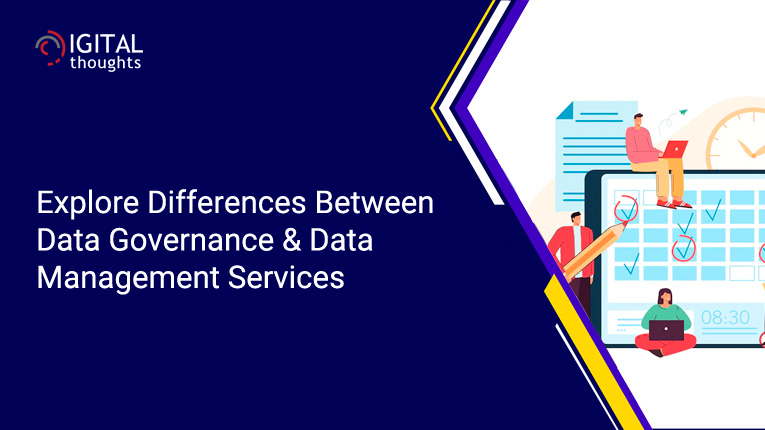An Introduction to Difference Between Data Governance & Data Management Services

While data is the biggest asset for enterprises today, managing the data and leveraging its potential to the fullest for the benefit of the business, has emerged as one of the biggest challenges. Today, data is growing at an exponential rate, and even as you read this, billions of bytes of data are being created. This mammoth data is of little use if enterprises fail to leverage its potential. Thankfully, there are several processes available for the enterprises to help them manage the data and streamline its use in multiple ways.
The leading IT service firms today are offering data related services, such as data governance services, data maintenance services, data management services, Big Data consulting services, data analytics & BI services, to name a few. However, before we seek to implement these data related services, it’s important to know what they signify and the benefits they bring to your business. Today we shall look at data management services and data governance services and the difference between them. So, let’s get started.

What is Data Management Services
Data management is the process of developing and implementing rules, architecture, and processes to manage a company's whole data lifecycle. For analysing complicated, Big Data, it's critical to have certain policies and procedures in place. Data management services is defined in the IT industry as the adoption of techniques to ensure that data is available to the appropriate users at the appropriate time for the appropriate tasks. The notion is that managers only have access to the data they need to make informed decisions.
The following are the different types of data services that come under data management services.
- Data Governance
- Data Architecture – Analysis and Design
- Database Management & Administration
- Data Security
- Data Quality Management
- Reference and Master Data Management
- Data Warehousing and Business Intelligence Management
- Meta Data Management
Due to the expanding number of data-related compliance rules, businesses must now include data management services into their systems. Furthermore, the sheer volume of data available to and controlled by enterprises has grown exponentially over time. As a result, an organization's effective management of structured and unstructured data should be handled in an organized manner. It goes without saying that data management services must follow industry best practises.
What is Data Governance Services
Data governance is an important part of the data management process, and as we have seen above, a component of data management services. The goal of data governance is to give companies concrete answers on how to assess and prioritise the financial rewards of data while minimising the business hazards of bad data. Governance necessitates the involvement of stakeholders from all business areas in order to assure the security, dependability, and integrity of all data. The following are the components of data governance services:
- Data quality
- Data security
- Data stewardship
- Data transparency
So, we can conclude that while data management services have a larger scope with multiple aspects of data, data governance is a part of data management solutions, and is concerned with ensuring the quality and security of data. It is the component of data management solutions that ensures the enterprise doesn’t have to deal with breaches to data security and offers protocol to follow in order to safeguard the data.
Data Management Services by The Digital Group
T/DG's expertise in the domain of data management solutions encompasses a wide range of technologies and systems. The Digital Group is conversant with a number of key advanced data platforms along with open source databases. We have the most up-to-date tools and platform capabilities for everything from data organisation with best governance standards to storing, processing, integrating, and cleansing data to final consumption.
T/DG has collaborations at multiple levels in the data management services sector, providing technical experience in master data management architecture, data quality, data governance, data security, and other market-specific data solutions, depending on customer needs and preferences.
